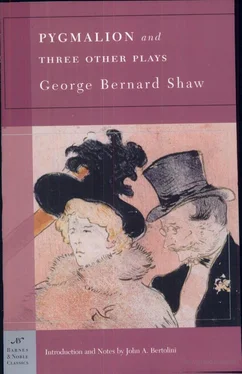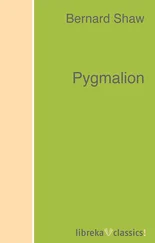To the play’s contemporaries who lived through World War I, Heartbreak House, however indirectly, expressed the feelings of sadness, futility, and madness the war provoked (T. E. Lawrence, known as Lawrence of Arabia, who became a great friend of Shaw, called it “the most blazing bit of genius in English literature”). The play never alludes explicitly to the context of the war, though. The closest it comes to doing so is at the end, when a zeppelin flies over the house during an air raid and bombs are dropped. The ghostly inhabitants of Heartbreak House are variously terrified and thrilled by the energy, sound, and destructive power of the air machines. At the end, Captain Shotover calls the raid Judgment Day, while the heroines, Ellie Dunn and Hesione Hushabye, hope that the zeppelin will return the next night. Does Shaw mean that these people, the failed leaders of the best society, are played out and long only for the world to be destroyed? Or is their thrilling to the wonder and raw energy of the sky machine a sign of their renewal?Their purgation? (Shaw had always bet on young women, like Ellie, to become “active verbs” and change the world.)
I think Shaw himself meant both possibilities to be weighed, for the direction Europe would take in 1919 was as unknown to Shaw as it was to Europe. But since both Shaw and Europe would see another World War twenty years later, it would seem that Ellie and Hesione had their hope fulfilled; the air machines indeed did come back. Shaw survived that war, too, and did not die until 1950, writing plays — practicing the craft of Shakespeare, as he put it — and prefaces, fables, screenplays, and political treatises, and enough letters for ten lives.
Shaw once inscribed one of his books as a gift to a friend. The friend subsequently fell on hard times and had to sell the valuable volume to a secondhand bookstore. Shaw found himself browsing the very bookstore at a later date and stumbled upon the volume inscribed by him. He immediately purchased it and re-sent it to his friend with the additional inscription: “With the renewed compliments of the author, G. Bernard Shaw.” The current neglect of Shaw may have nothing to do with hard economic times, but the present two editions of his plays by Barnes & Noble Classics should be understood to be placed before the public — with the renewed compliments of their author.
JOHN A. BERTOLINI was educated at Manhattan College and Columbia University. He teaches English and dramatic literature, Shakespeare, and film at Middlebury College, in Vermont, where he is Ellis Professor of the Liberal Arts. He is the author of The Playwrighting Self of Bernard Shaw and editor of Shaw and Other Playwrights; he has also published articles on Alfred Hitchcock, Renaissance drama, and British and American dramatists. He is writing a book on Terence Rattigan’s plays.
FIRST AID TO CRITICS
BEFORE DEALING WITH the deeper aspects of Major Barbara, let me, for the credit of English literature, make a protest against an unpatriotic habit into which many of my critics have fallen. Whenever my view strikes them as being at all outside the range of, say, an ordinary suburban churchwarden, they conclude that I am echoing Schopenhauer, Nietzsche, Ibsen, Strindberg, Tolstoy, {1} 1 1 (p. 5) they conclude that I am echoing Schopenhauer, Nietzsche, Ibsen, Strindberg, Tolstoy: Shaw is naming several controversial figures of his time: German philosophers Arthur Schopenhauer (1788 — 1860) and Friedrich Wilhelm Nietzsche (1844-1900); Norwegian playwright and poet Henrik Johan Ibsen (1828 — 1906); Swedish playwright and novelist August Strindberg (1849 — 19 12); and Russian novelist Leo Tolstoy (1828-1910).
or some other heresiarch [1] Leader of a heresy (belief contrary to orthodox tenets of a religion).
in northern or eastern Europe.
I confess there is something flattering in this simple faith in my accomplishment as a linguist and my erudition as a philosopher. But I cannot tolerate the assumption that life and literature is so poor in these islands that we must go abroad for all dramatic material that is not common and all ideas that are not superficial. I therefore venture to put my critics in possession of certain facts concerning my contact with modern ideas.
About half a century ago, an Irish novelist, Charles Lever, wrote a story entitled A Day’s Ride: A Life’s Romance. It was published by Charles Dickens in Household Words, and proved so strange to the public taste that Dickens pressed Lever to make short work of it. I read scraps of this novel when I was a child; and it made an enduring impression on me. The hero was a very romantic hero, trying to live bravely, chivalrously, and powerfully by dint of mere romance-fed imagination, without courage, without means, without knowledge, without skill, without anything real except his bodily appetites. Even in my childhood I found in this poor devil’s unsuccessful encounters with the facts of life, a poignant quality that romantic fiction lacked. The book, in spite of its first failure, is not dead: I saw its title the other day in the catalogue of Tauchnitz. [2] German publisher of American and British literature (including Shaw).
Now why is it that when I also deal in the tragi-comic irony of the conflict between real life and the romantic imagination, no critic ever affiliates me to my countryman and immediate forerunner, Charles Lever, whilst they confidently derive me from a Norwegian author of whose language I do not know three words, and of whom I knew nothing until years after the Shavian Anschauung [3] Viewpoint, outlook (German).
was already unequivocally declared in books full of what came, ten years later, to be perfunctorily labelled Ibsenism. I was not Ibsenist even at second hand; for Lever, though he may have read Henri Beyle, alias Stendhal, certainly never read Ibsen. Of the books that made Lever popular, such as Charles O’ Malley and Harry Lorrequer, I know nothing but the names and some of the illustrations. But the story of the day’s ride and life’s romance of Potts (claiming alliance with Pozzo di Borgo) caught me and fascinated me as something strange and significant, though I already knew all about Alnaschar and Don Quixote and Simon Tappertit and many another romantic hero mocked by reality. {2} 2 2 (p. 6) though I already knew all about Alnaschar and Don Quixote and Simon Tappertit and many another romantic hero mocked by reality: Shaw lists three fictional romantic heroes: In “The Barber’s Fifth Brother,” a tale from The Arabian Nights’ Entertainments, Alnaschar is a dreamer who invests in glassware in a scheme to become rich and marry the vizier’s daughter, but then shatters the glass in a rage against his imaginary wife; Don Quixote is the idealistic romantic hero of the satirical romance of that name by Spanish novelist Miguel de Cervantes (1547-1 616); Simon Tappertit, in Charles Dickens’s novel Barnaby Rudge (1841), is a locksmith’s apprentice given to ambitious and romantic delusions.
From the plays of Aristophanes to the tales of Stevenson that mockery has been made familiar to all who are properly saturated with letters.
Where, then, was the novelty in Lever’s tale? Partly, I think, in a new seriousness in dealing with Potts’s disease. [4] Pun on an actual spinal pathology, Pott’s disease.
Formerly, the contrast between madness and sanity was deemed comic: Hogarth shews us how fashionable people went in parties to Bedlam to laugh at the lunatics. I myself have had a village idiot exhibited to me as something irresistibly funny. On the stage the madman was once a regular comic figure: that was how Hamlet got his opportunity before Shakespear touched him. The originality of Shakespear’s version lay in his taking the lunatic sympathetically and seriously, and thereby making an advance towards the eastern consciousness of the fact that lunacy may be inspiration in disguise, since a man who has more brains than his fellows necessarily appears as mad to them as one who has less. But Shakespear did not do for Pistol and Parolles what he did for Hamlet. The particular sort of madman they represented, the romantic make-believer, lay outside the pale of sympathy in literature: he was pitilessly despised and ridiculed here as he was in the east under the name of Alnaschar, and was doomed to be, centuries later, under the name of Simon Tappertit. When Cervantes relented over Don Quixote, and Dickens relented over Pickwick, they did not become impartial: they simply changed sides, and became friends and apologists where they had formerly been mockers.
Читать дальше












